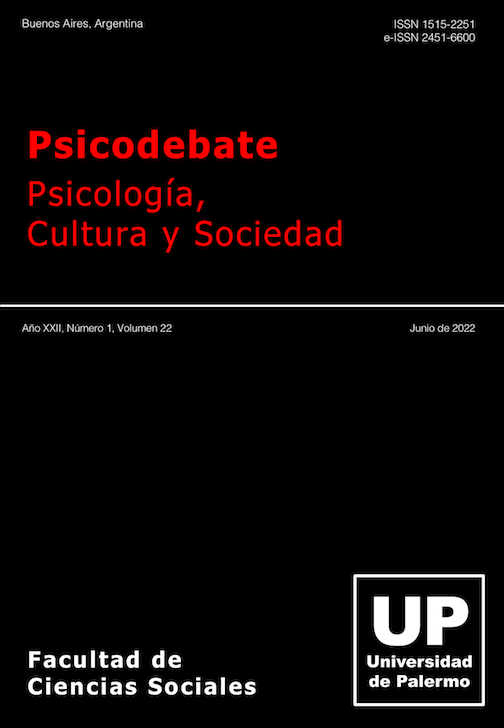Mobile Applications for Mental Health: Perception and Perspectives in Argentina
Abstract
The use of digital technologies and mobile applications has grown worldwide markedly. The reduction of care costs and greater access to health by the population are some of its advantages. The aim of this study was to know the perception and perspective of potential users of mobile applications in Argentina. The study was exploratory, mixed, and predominantly quantitative. The sample is made up of 209 adults and residents of Argentina (Mage = 32.66, SD = 8.36). 50.7% of the respondents were women and 48.8%, men. 73.7% had no knowledge of mental health applications and 75.1% will use them. The benefits for respondents are accessibility, speed, and access to reliable information. These data will allow us to think that the population would be receptive to the use of applications in mental health.
Downloads
References
Alonso-Arévalo, J., & Mirón-Canelo, J. A. (2017). Aplicaciones móviles en salud: potencial, normativa de seguridad y regulación. Revista Cubana de Información en Ciencias de la Salud (ACIMED), 28(3), 1-13.
Bunge, E., López, P., Mandil, J., Gomar, M., & Borgialli, R. (2009). Actitudes de los terapeutas argentinos hacia la incorporación de nuevas tecnologías en psicoterapia. Revista Argentina de Clínica Psicológica, 18(3), 209-216.
Celleri, M., & Garay, C. J. (2021). Aplicaciones móviles para ansiedad: una revisión en Argentina. Revista Argentina de Ciencias del Comportamiento, 13(1), 17-24. https://doi.org/10.32348/1852.4206.v13.n1.23681
Chavira-García, J., & Arredondo-López, A. A. (2017). Aplicaciones móviles como herramientas en los servicios de salud. Horizonte sanitario, 16(2), 85-91. https://doi.org/10.19136/hs.a16n2.1498
Cheung, D. S. T., Or, C. K., So, M. K. P., Ho, K., & Tiwari, A. (2019). The Use of eHealth Applications in Hong Kong: Results of a Random-Digit Dialing Survey. Journal of medical systems, 43(9), 293. https://doi.org/10.1007/s10916-019-1422-2
Distefano, M. J., Cataldo, G., Mongelo, M. C., Mesurado, B., & Lamas, M. C. (2018). Conocimiento y uso de tecnologías digitales en psicoterapia entre los psicólogos de Buenos Aires. Perspectivas en Psicología: Revista de Psicología y Ciencias Afines, 15(1), 79-89.
Donker, T., Petrie, K., Proudfoot, J., Clarke, J., Birch, M. R., & Christensen, H. (2013). Smartphones for smarter delivery of mental health programs: a systematic review. Journal of medical Internet research, 15(11), e247. https://doi.org/10.2196/jmir.2791
Glaser, B. G., & Strauss, A. L. (1967). The discovery of grounded theory: Strategies for qualitative research. Aldine. https://doi.org/10.1097/00006199-196807000-00014
Grist, R., Cliffe, B., Denne, M., Croker, A., & Stallard, P. (2018). An online survey of young adolescent girls' use of the internet and smartphone apps for mental health support. BJPsych open, 4(4), 302-306. https://doi.org/10.1192/bjo.2018.43
Hur, J. W., Kim, B., Park, D., & Choi, S. W. (2018). A Scenario-Based Cognitive Behavioral Therapy Mobile App to Reduce Dysfunctional Beliefs in Individuals with Depression: A Randomized Controlled Trial. Telemedicine and e-Health, 24(9), 710-716. https://doi.org/10.1089/tmj.2017.0214
Kumar, S., Nilsen, W. J., Abernethy, A., Atienza, A., Patrick, K., Pavel, M., Riley, W. T., Shar, A., Spring, B., Spruijt-Metz D., Hedeker, D., Honavar, V., Kravitz, R., Lefebvre R. C., Mohr, D. C., Murphy, S. A., Quinn, C., Shusterman, V., & Hedeker, D. (2013). Mobile health technology evaluation: the mHealth evidence workshop. American journal of preventive medicine, 45(2), 228-236. https://doi.org/10.1016/j.amepre.2013.03.017
Mohr, D. C., Tomasino, K. N., Lattie, E. G., Palac, H. L., Kwasny, M. J., Weingardt, K., Karr., C. J., Kaiser, S. M., Rossom, R. C., Bardsley, L. R., Caccamo, L., Stiles-Shields, C., & Schuller, S. M. (2017). IntelliCare: an eclectic, skills-based app suite for the treatment of depression and anxiety. Journal of medical Internet research, 19(1), e10. https://doi.org/10.2196/jmir.6645
Organización Mundial de la Salud. (2016). Salud: uso de las tecnologías móviles inalámbricas en la salud pública: informe de la Secretaría (No. EB139/8). https://apps.who.int/iris/handle/10665/250908
Research2Guidance. (2017). mHealth App Economics 2017: Current Status and Future Trends in Mobile Health. https://research2guidance.com/product/mhealth-economics-2017-current-status-and-future-trends-in-mobile-health/
Rubanovich, C. K., Mohr, D. C., & Schueller, S. M. (2017). Health app use among individuals with symptoms of depression and anxiety: a survey study with thematic coding. JMIR mental health, 4(2), e22. https://doi.org/10.2196/mental.7603
Stolz, T., Schulz, A., Krieger, T., Vincent, A., Urech, A., Moser, C., Westermann, S., & Berger, T. (2018). A mobile app for social anxiety disorder: A three-arm randomized controlled trial comparing mobile and PC-based guided self-help interventions. Journal of consulting and clinical psychology, 86(6), 493-504. https://doi.org/10.1037/ccp0000301
Sucala, M., Cuijpers, P., Muench, F., Cardoș, R., Soflau, R., Dobrean, A., Achimas-Cadariu, P., & David, D. (2017). Anxiety: There is an app for that. A systematic review of anxiety apps. Depression and anxiety, 34(6), 518-525. https://doi.org/10.1002/da.22654
Tomlinson, M., Rotheram-Borus, M. J., Swartz, L., & Tsai, A. C. (2013). Scaling up mHealth: where is the evidence?. PLoS medicine, 10(2), e1001382. https://doi.org/10.1371/journal.pmed.1001382
Torous, J., Wisniewski, H., Liu, G., & Keshavan, M. (2018). Mental Health Mobile Phone App Usage, Concerns, and Benefits Among Psychiatric Outpatients: Comparative Survey Study. JMIR mental health, 5(4), e11715. https://doi.org/10.2196/11715
Watts, S., Mackenzie, A., Thomas, C., Griskaitis, A., Mewton, L., Williams, A., & Andrews, G. (2013). CBT for depression: a pilot RCT comparing mobile phone vs. computer. BMC psychiatry, 13(1), 49. https://doi.org/10.1186/1471-244X-13-49
Copyright (c) 2022 Psicodebate

This work is licensed under a Creative Commons Attribution 4.0 International License.
Authors who publish with this journal agree to grant Psicodebate copyright and right of publication and accept the work being licensed under a Creative Commons Attribution License that allows others to share the work with an acknowledgement of the authors and Psicodebate.

















